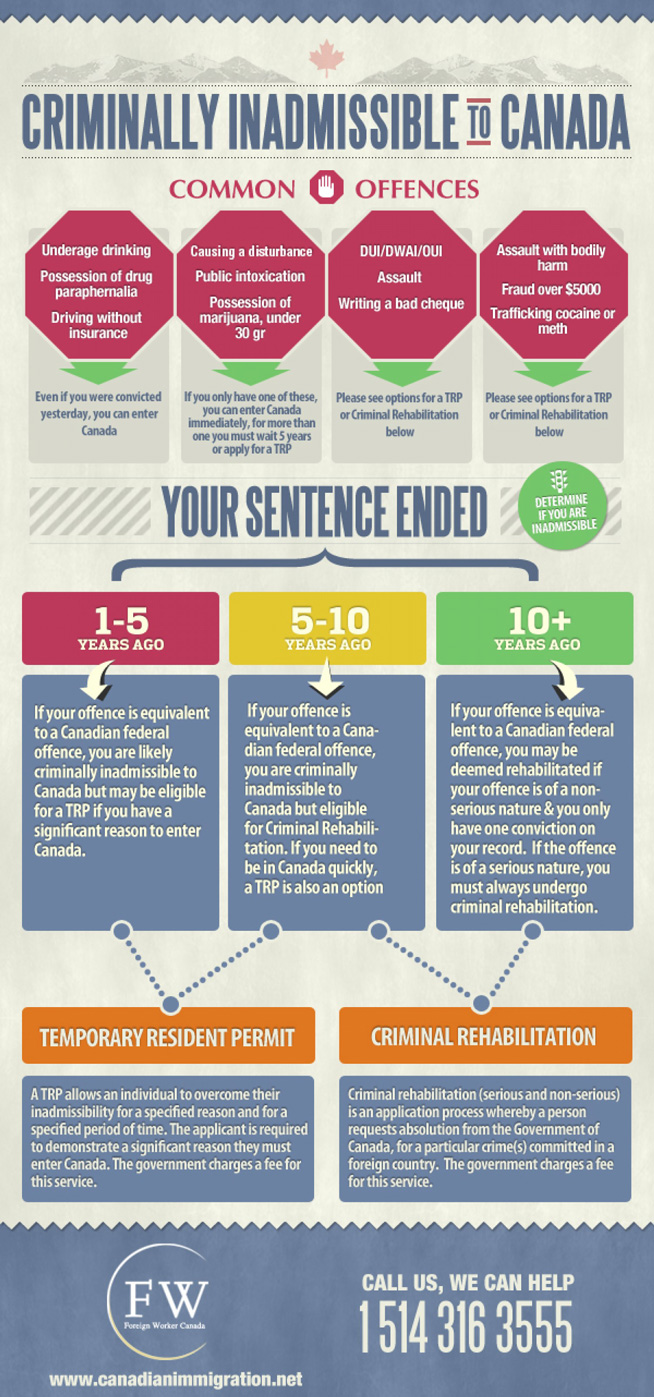If you are planning on visiting Canada with a criminal record, you may find that you are criminally inadmissible. Simply put, criminal inadmissibility means that, because of prior events in your criminal history, your entrance to Canada is forbidden. The status of your inadmissibility holds true regardless of the importance or duration of your travel.
As you’ll discover below, we’ve compiled the most important aspects of criminal inadmissibility to give you a detailed understanding of the subject.
If criminal inadmissibility is something you’re facing, we cannot stress strongly enough how important it is to familiarize yourself with the surrounding laws and policies. Doing so will prepare you for the immigration difficulties on your horizon, and how to overcome them.
Why do Criminal Histories Affect Travel to Canada?
You may be wondering, why are people with criminal histories, even very minor ones, not allowed to enter Canada?
Immigration, Refugees and Citizenship Canada (IRCC) and Canadian Border Services Agency (CBSA) both place massive importance on ensuring the security of Canada and its citizens.
For this reason, they are determined to deny entrance of any and all persons they feel are likely to commit a crime during their visit to Canada.
How Does Canada Know If You Have a Criminal Record?
When entering Canada, you are required to show your passport and any necessary visas to a border agent at the port of entry through which you are passing. When the border agent scans your passport, they will have access to not only the personal information printed on it, but also your criminal record.
Border agents have access to, through their CPIC databases, the United States National Crime Information Center. State police databases are also accessible to CBSA agents.
Border agents at international airports receive passenger lists and conduct background checks on the names that appear on them. A name on the list that produces a criminal record will be flagged for secondary screening. With these records, border agents will determine a person’s admissibility to Canada.
The most accurate and up to date information about criminal inadmissibility can be found in the Immigration and Refugee Protection Act (IRPA), which is the official legislation regarding immigration to Canada. Sections 33-43 of the Act deal exclusively with inadmissibility. The section you’ll want to focus on is 36—which dictates criminal inadmissibility.
Criminal Equivalency: Why You Need to Know It
To determine whether you are admissible to Canada, you must consider Canadian laws. The only way to judge if you are indeed criminally inadmissible to Canada is to first translate your conviction into the language of Canadian law.
Does the offense on your record have a counterpart in Canada? If so, then there is a chance that you are inadmissible to Canada. This concept is known as equivalence.
Offenses like DUI and reckless driving can lead to criminal inadmissibility, as they are recognized as indictable offenses in Canada. For example, if you were convicted of a DUI charge within the past ten years, you would not be able to enter Canada.
Determining equivalence can be tricky and if the correct equivalence is not found you may falsely believe that you are admissible to Canada. This could lead to being turned around at the border unexpectedly.
Committing an Act: Inadmissibility Without Conviction
Inadmissibility may also be attained without a conviction. This usually happens if someone has a pending charge on their record. If you have been charged with a DUI or another offense, but have not yet been tried, you may be turned away at the Canadian border.
Another example of inadmissibility without conviction is if the offense was excused in another country, but would have been considered a crime in Canada.
Here’s a dramatic example for clarity:
If a person stoned someone to death in another country, but was excused on the basis of their spouse committing adultery, Canada would still consider them inadmissible.
If you are charged with an offense, but are acquitted or the case against you is dismissed, you will not likely face inadmissibility issues. However, we strongly recommend you double check, lest you waste a trip to the border, only to get refused.
Will Traveling With a Young Offender Affect Admissibility to Canada?
In Canada, if you are between the ages of 12-18, and commit an offense, you are considered a “young offender”. In most cases, juvenile convictions do not lead to criminal inadmissibility into Canada. However, a few exceptions exist.
If your country has a provision for young offenders, but as a young person you were still tried in adult court due to either the severity or the nature of your crime, you will be considered inadmissible.
If your country does not have a provision for young offenders, yet under review, Canada deems that the circumstances of your offense would have lead you to be tried as an adult under Canadian Criminal Law, you will also be considered inadmissible, regardless of your age.
Overcoming Criminal Inadmissibility
As you can probably already tell, the process for determining whether or not you are criminally inadmissible is very complicated, but this is just the beginning! There are ways to overcome your criminal inadmissibility.
Our firm processes hundreds of these applications a year—so do not hesitate to contact us for your free admissibility assessment!
FWCanada is a Montreal-based immigration law firm that provides professional legal services on Canadian immigration. For more tips and updates on Canadian immigration follow FWCanada on Facebook, Twitter, and Linkedin.


